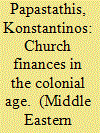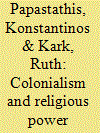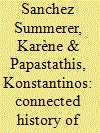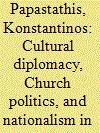|
|
|
Sort Order |
|
|
|
Items / Page
|
|
|
|
|
|
|
| Srl | Item |
| 1 |
ID:
126636


|
|
|
|
|
| Publication |
2013.
|
| Summary/Abstract |
The British Mandatory government established in 1921 a commission in order to control the finances and the vast landed property of the Orthodox Patriarchate of Jerusalem. This paper sketches out the commission's early activity, arguing that its significant powers and its operation at the expense of the clerical apparatus were not so much grounded on the need to facilitate the recovery of the historic church, but were in fact determined by the socio-political developments, at a local and international level, as well as by the necessity to strengthen the British authority in Palestine during a fluid period for public order.
|
|
|
|
|
|
|
|
|
|
|
|
|
|
|
|
| 2 |
ID:
131459


|
|
|
|
|
| Publication |
2014.
|
| Summary/Abstract |
This article critically assesses the conflict within the Orthodox Church of Jerusalem between the Greek hierarchy and the Arab laity concerning the proposals of the Mandatory Government for a new regulatory framework for patriarchal operation. The British presented two draft reform ordinances, neither of which met Arab expectations. Instead of promoting the laity's emancipation from 'foreign' Greek administrative and financial control, the ordinances left little room for a true inversion of the power structure between the two opposing camps, retaining the status quo at the expense of the Arab Orthodox rights.
|
|
|
|
|
|
|
|
|
|
|
|
|
|
|
|
| 3 |
ID:
179889


|
|
|
|
|
| Summary/Abstract |
The special issue critically explores, at a micro and macro level, the structural role and religious, cultural and political interactions of the Greek-Orthodox, Melkite and Syriac communities in late Ottoman and Mandate Syria and Palestine. It seeks to identify archival gaps, and to link the study of the micro-scale level of everyday cultural and religious life to the macro-narratives of global change affecting Christian communities, in a connected perspective, via dynamics of cultural and religious personal and institutional interactions. The Christian communities, both as institutions and lay bodies, are of special interest for the field of Levantine studies, since they were placed at the heart of the local power game, expressing the quest for social emancipation, while also keeping close links with diplomatic actors, colonial institutions, and foreign religious agents. The research presented lies on the idea that the communities in focus were inextricably linked, being actors operating within the same multi-ethnic periphery, having the same legal status, and being in contact to foreign agents, while at the same time politically dependent to the centralized ottoman and mandatory authorities.
|
|
|
|
|
|
|
|
|
|
|
|
|
|
|
|
| 4 |
ID:
179894


|
|
|
|
|
| Summary/Abstract |
The transition period from the Ottoman withdrawal from Jerusalem to the establishment of British rule was critical for the Orthodox Church. On the one hand, the rule of Patriarch Damianos was contested by a powerful opposition within the Brotherhood of the Holy Sepulchre, which was supported by the government in Athens. On the other hand, the Arab laity sided with Damianos, putting at the same time pressure on the new administration to upgrade its status both at a political and religious level. This paper attempts to contextually sketch out the historical course of events, paying special attention on the religious policy agenda of the new authorities, as well as the diplomatic and cultural factors influencing the decision-making process. Overall, the paper suggests that the internal church crisis under examination was determined by the historical reformulation caused by WWI, the development of Arab nationalism, national ambitions in Athens, and British local and diplomatic policy objectives. Moreover, it argues that this period of crisis should probably be viewed as the starting point of the modern history of the institution (This article extends and updates the analysis of my previous paper, Papastathis 2009 (in Greek). In particular, it employs and contextually analyses new archival sources from the Historic and Diplomatic Archive of the Greek Ministry of Foreign Affairs. The new archival material is related to the intra-religious background and institutional framework, and to the diplomatic and political aspects of the question under examination).
|
|
|
|
|
|
|
|
|
|
|
|
|
|
|
|
|
|
|
|
|